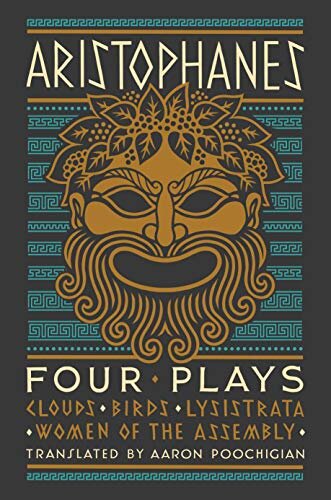Four Plays by Aristophanes
/Four Plays: Clouds, Birds, Lysistrata, Women of the Assembly
By Aristophanes
Translated by Aaron Poochigian
Liveright, 2021
“Given the momentous historical transitions he witnessed - the glory of Periclean Athens in his youth, the Peloponnesian War in his adulthood, and the attempted revival of Athens in his old age,” writes Aaron Poochigian in his new translation of the ancient Greek comedian’s four best-loved plays, ‘and how he responded to them in his comic art, Aristophanes is a singularly important, utterly unique writer.”
Leaving aside that faddish tautology of “utterly unique” (Poochigian also works in a tooth-grating “general consensus”), this is of course entirely true: even the fraction of his work that survives (about one-quarter of the whole) clearly demonstrates the centrality of Aristophanes to the intellectual life of his time - dramatizing it, exaggerating it, and most of all lampooning it. The great and mighty of his day could count on being scorned by name in his work. In fact, they could count on being name-checked on opening night, while they sat in the front row and listened to the audience burst into laughter at their expense.
Poet and translator Aaron Poochigian has now translated four of those surviving plays in an elegant and wonderfully approachable new volume from Liveright. The plays - Clouds, Birds, Lysistrata, and Women of the Assembly - were produced over the span of thirty years and are threaded through with the kinds of subtlety that’s often missed by readers (and too often also missed by translators). They can also, miraculously, still be funny in the rare instances when they’re still staged for an audience.
They’re very often also still funny in Poochigian’s translations in these pages, where he relies heavily on both iambic pentameter and common idiom to take the strangeness out of these ancient works and help them to speak to the present age. The results are almost always very readable. Take this histrionic swap of sassing talk between two choruses in Lysistrata:
Old Men’s Chorus Leader:
It’s terrible that they, mere women, now are criticizing fellow
citizens and discussion bronze-wrought shields, and, what is even worse,
working to reconcile us with the Spartans, men less to be trusted
than famished wolves! In actual fact the plot the women have been weaving
is aimed at tyranny. But they will never tyrannize yours truly -
I’ll be prepared and henceforth “hide a sword in a myrtle bough.”
I’ll march down to Aristogeiton’s statue in the market
(striking a heroic pose)
and stand like this right next to him.
(looking at the Old Women’s Chorus Leader)
Oh, how I’ve got an overwhelming
desire in me to sock this god-despised old woman on the jaw.
Old Women’s Chorus Leader:
Try it, and your own mom won’t recognize you when you get back home.
Rouse yourselves, fellow geriatrics! Lay your jackets on the ground.
The openness of this and so many other passages under Poochigian’s attention is obviously inviting, and it throws an understandable amount of weight on the book’s critical apparatus. There’s no avoiding the fact that the comedy of Aristophanes is both intensely topical and extensively allusive; a translator who doesn’t make sense of those qualities for the monoglot reader has failed in one major part of the job. Take that quoted passage, for example. Who’s Aristogeiton, when he’s at home? Poochigian’s note (all of which are at crowded together at the back of the book, rather than at the foot of each page where they could make themselves useful) has this to say:
In 514 BCE two Athenians, Harmodius and Aristogeiton, assassinated Hipparchus, the brother of the tyrant Hippias. They were subsequently regarded as heroes of the democracy, and statues of them were set up in the agora (marketplace) of Athens.
Despite how engaging Poochigian’s translations themselves are, it must be said that this could easily be done better. Does it explain that quote about the myrtle bough? It does not. Might there be resonances in the Aristogeiton story (which involves not only a male lover but a nagging woman) that might have made the original Lysistrata audience roar with knowing laughter, resonances much more telling than a nod in the general direction of tyranny? Readers will have to look elsewhere to find out.
Some sacrifices of that kind are almost inevitable in any popular edition of an ancient author, and although Four Plays makes more of those sacrifices than it should, a good balance is still achieved. And the appearance of Aristophanes on the bookstore New Release tables is always a cheering thing.
Steve Donoghue is a founding editor of Open Letters Monthly. His book criticism has appeared in The Boston Globe, The Wall Street Journal, The Washington Post, and The American Conservative. He writes regularly for The National, The Vineyard Gazette, and The Christian Science Monitor. His website is http://www.stevedonoghue.com.
